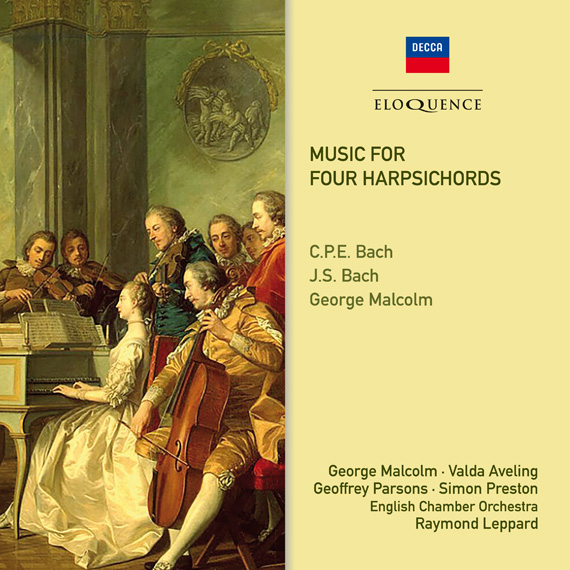There were many worlds in George Malcolm’s (1917–1997) universe – organist, harpsichordist, pianist, composer, choral director and conductor – and this one demonstrates his unique skill as a solo performer who, throughout his career, more than any other individual defined the harpsichord’s identity in England. After World War II, Malcolm became the most famous English harpsichordist of his day with a brilliant technique, superb musicianship and an idiosyncratically modern approach to playing which, for his audiences, came to exemplify the very nature of the instrument itself.
The inspiration for this recording was a familiar event on London’s musical scene during the late 1950s and 1960s: the annual ‘Thomas Goff Harpsichord Jamboree’, held at London’s Royal Festival Hall. Four Goff harpsichords were arrayed on the stage with, at various times, harpsichordists Thurston Dart, George Malcolm, Simon Preston, Denis Vaughan, Valda Aveling, Eileen Joyce, Geoffrey Parsons and Simon Preston taking part.
Malcolm’s ‘Variations on a Theme of Mozart’ were composed specifically (and ingeniously) for four solo Thomas Goff instruments, largely to display the art of modern harpsichord stop-changing. The music presented on this recording is a cross section of the works played at Goff’s annual concerts, with conductor Raymond Leppard – also a harpsichordist who played Goff instruments – and the English Chamber Orchestra.
Notes are by Peter Watchorn, an Australian-born, US-based harpsichordist, one of whose teachers, Harold Lobb, was also an associate of Malcolm.
CARL PHILIPP EMANUEL BACH
Concerto in F major for Two Claviers & Orchestra, Wq. 4
(Arranged by Raymond Leppard for four harpsichords)
JOHANN SEBASTIAN BACH
Concerto in A minor for Four Harpsichords, Strings & Continuo, BWV 1065
Concerto in D minor for Three Harpsichords, Strings & Continuo, BWV 1063
GEORGE MALCOLM
Variations on a theme by Mozart for four harpsichords
George Malcolm, harpsichord
Valda Aveling, harpsichord
Geoffrey Parsons, harpsichord
Simon Preston, harpsichord (1–6, 10)
English Chamber Orchestra
Raymond Leppard
Recording Producer: David Harvey
Balance Engineer: Alec Rosner
Recording Location: Decca Studio 3, West Hampstead, London, UK, 31 May–1 June 1966
‘This [is a] very attractive disc … these pieces cry out for stereo and I’m glad that the engineers haven’t hesitated to make maximum use of directional effect. … I warmly recommend this enjoyable record’ Gramophone, October 1967

